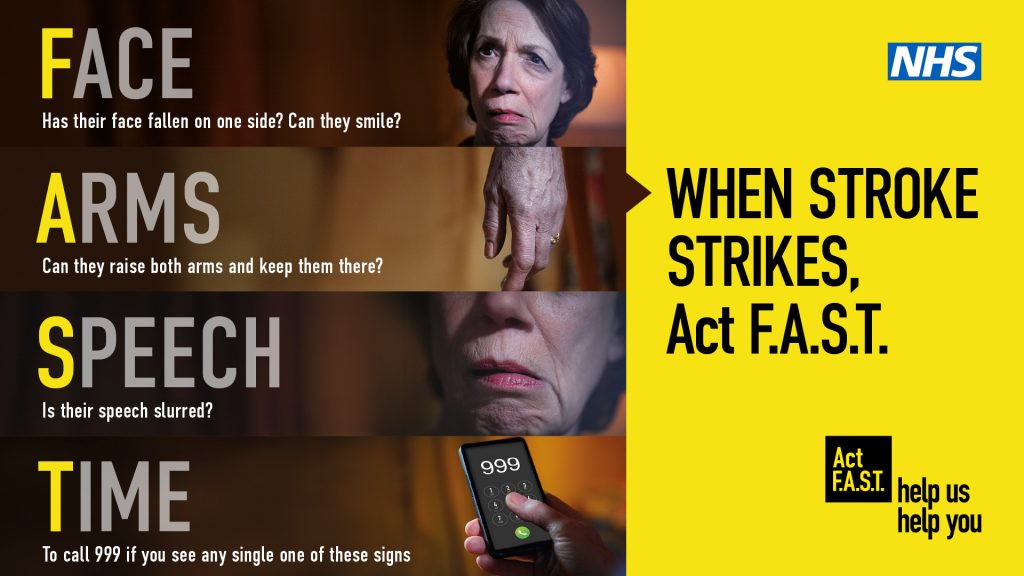
On 13 February 2023, NHS England, in association with the Stroke Association, relaunched the Act F.A.S.T. stroke campaign, which highlights that a stroke is a medical emergency and urges the public to call 999 immediately if they notice any single one of the signs of a stroke in themselves or others.
The aim of the campaign is to reduce the amount of time between someone having a stroke and arriving at the hospital (and therefore receiving appropriate care including thrombolysis or thrombectomy, if appropriate) by:
- Increasing knowledge of the signs of a stroke
- Increasing knowledge of stroke as a medical emergency; and
- Increasing intention to act quickly on the signs of a stroke by calling 999
The campaign has run for more than ten years and the F.A.S.T. acronym (Face, Arms, Speech, Time) is effective in driving calls to 999 for stroke, saving lives and reducing disability. It also provides a simple test to help people identify the most common signs of a stroke.
Think and Act F.A.S.T. if you see any single one of these signs of a stroke,
a stroke is a medical emergency:
- Face – has their face fallen on one side? Can they smile?
- Arms – can they raise both arms and keep them there?
- Speech – is their speech slurred?
- Time – even if you’re not sure, call 999.
When Stroke Strikes Act F.A.S.T. Call 999
Some other signs that may be due to a stroke or mini-stroke include:
- Sudden loss of vision or blurred vision in one or both eyes
- Sudden weakness or numbness on one side of your body (including in your leg)
- Sudden memory loss or confusion
- Sudden dizziness, unsteadiness or a sudden fall, especially with any of the other signs
- Call 999 immediately if you notice any single one of the signs of a stroke.
FOR MORE INFORMATION please visit www.nhs.uk/ActFAST for more information.
FACTS AND STATS
- Stroke is the fourth single leading cause of death in the UK and the single largest cause of complex disability.
- The estimated aggregate societal cost of stroke is £26 billion per year,
- including £8.6 billion for NHS and social care.
- Around 100,000 people have strokes each year in the UK. This is around one stroke every five minutes.
- Stroke also disproportionately affects some groups, with black people being twice as likely to have a stroke than white people. On average, people of Black African, Black Caribbean and South Asian descent in the UK have strokes when they are younger.
- Prompt recognition of symptoms ensures that people having a stroke can get emergency treatment earlier giving them the best chance of survival and recovery.
It is a medical emergency that requires immediate attention as every minute is vital. That is why calling 999 is so crucial. Early recognition of symptoms can give stroke patients those extra precious minutes, enabling faster access to specialist treatment and increasing the chances of a recovery which could reduce the long-term effects, such as disability.
High blood pressure, diabetes and sickle cell are significant risk factors that can contribute to increasing the likelihood of having a stroke, and there is a high prevalence of these diseases in Black and South Asian communities. In addition to this, there are often cultural, religious and language barriers preventing these groups from seeking medical advice early.
ACCESSIBILITY ACTIVITY
Disabled people, particularly those with a visual, hearing or learning disability, make up a proportion of the target audience of the Act FAST campaign.
- Stroke is the fourth single leading cause of death in the UK and the single largest cause of complex disability costing the NHS £2.8 billion (and the wider economy over £9 billion) each year.
- There are more than 100,000 incidences of stroke each year in the UK. This is around one stroke every five minutes.
- The latest data show a 12% drop in hospital attendance for stroke during the lockdown period of the pandemic, between March – April 2020
- Stroke is an inequalities issue with black people being twice as likely to have a stroke than white people. On average, people of Black African, Black Caribbean and South Asian descent in the UK have strokes when they are younger. With COVID-19 disproportionately affecting these groups, there’s an even greater need to ensure that they aren’t being affected by other conditions. The campaign will include specific activity targeted at ethnic minority communities.
- PHE data suggests that there were 1,413 excess deaths from Stroke between 21 March 2020 and 22 January 2021, 7% higher than expected.
- With the current national restrictions in place, there’s an even greater need to run this campaign activity to remind people of the symptoms, and to take urgent action.
